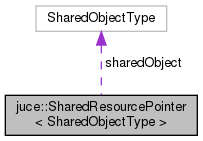A smart-pointer that automatically creates and manages the lifetime of a shared static instance of a class. More...
#include <juce_SharedResourcePointer.h>

Classes | |
| struct | SharedObjectHolder |
Public Member Functions | |
| SharedResourcePointer () | |
| Creates an instance of the shared object. More... | |
| SharedResourcePointer (const SharedResourcePointer &) | |
| ~SharedResourcePointer () | |
| Destructor. More... | |
| SharedObjectType & | get () const noexcept |
| Returns the shared object. More... | |
| SharedObjectType & | getObject () const noexcept |
| Returns the object that this pointer references. More... | |
| int | getReferenceCount () const noexcept |
| Returns the number of SharedResourcePointers that are currently holding the shared object. More... | |
| operator SharedObjectType * () const noexcept | |
| Returns the shared object. More... | |
| SharedObjectType * | operator-> () const noexcept |
| Returns the shared object. More... | |
Private Member Functions | |
| void | initialise () |
| SharedResourcePointer & | operator= (const SharedResourcePointer &)=delete |
Static Private Member Functions | |
| static SharedObjectHolder & | getSharedObjectHolder () noexcept |
Private Attributes | |
| SharedObjectType * | sharedObject |
A smart-pointer that automatically creates and manages the lifetime of a shared static instance of a class.
The SharedObjectType template type indicates the class to use for the shared object - the only requirements on this class are that it must have a public default constructor and destructor.
The SharedResourcePointer offers a pattern that differs from using a singleton or static instance of an object, because it uses reference-counting to make sure that the underlying shared object is automatically created/destroyed according to the number of SharedResourcePointer objects that exist. When the last one is deleted, the underlying object is also immediately destroyed. This allows you to use scoping to manage the lifetime of a shared resource.
Note: The construction/deletion of the shared object must not involve any code that makes recursive calls to a SharedResourcePointer, or you'll cause a deadlock.
Example:
{Core}
|
inline |
Creates an instance of the shared object.
If other SharedResourcePointer objects for this type already exist, then this one will simply point to the same shared object that they are already using. Otherwise, if this is the first SharedResourcePointer to be created, then a shared object will be created automatically.
References juce::SharedResourcePointer< SharedObjectType >::initialise().
|
inline |
|
inline |
Destructor.
If no other SharedResourcePointer objects exist, this will also delete the shared object to which it refers.
References juce::SharedResourcePointer< SharedObjectType >::getSharedObjectHolder().
|
inlinenoexcept |
Returns the shared object.
References juce::SharedResourcePointer< SharedObjectType >::sharedObject.
|
inlinenoexcept |
Returns the object that this pointer references.
The pointer returned may be a nullptr, of course.
References juce::SharedResourcePointer< SharedObjectType >::sharedObject.
|
inlinenoexcept |
Returns the number of SharedResourcePointers that are currently holding the shared object.
References juce::SharedResourcePointer< SharedObjectType >::getSharedObjectHolder(), and juce::SharedResourcePointer< SharedObjectType >::SharedObjectHolder::refCount.
|
inlinestaticprivatenoexcept |
|
inlineprivate |
|
inlinenoexcept |
Returns the shared object.
References juce::SharedResourcePointer< SharedObjectType >::sharedObject.
|
inlinenoexcept |
Returns the shared object.
References juce::SharedResourcePointer< SharedObjectType >::sharedObject.
|
privatedelete |
|
private |